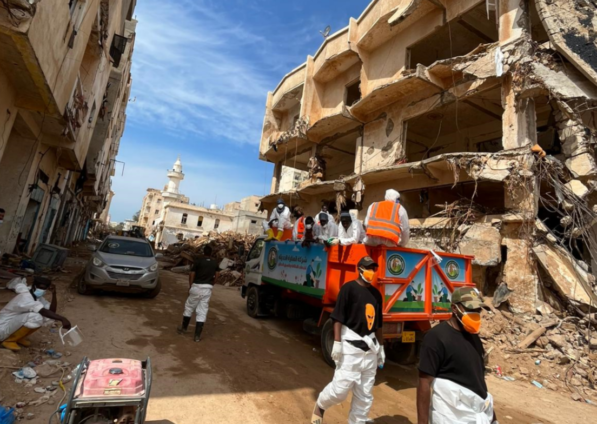In a harrowing turn of events, Libya finds itself grappling with an unprecedented catastrophe as the nation seemingly turned a blind eye to dire storm warnings.
The consequences have been devastating, with a death toll that continues to rise and tens of thousands of citizens displaced.
The storm, which ravaged Libya, had been predicted and warnings were issued to the public, particularly in the areas most likely to be affected. However, critical warnings from Roaya, the country's most reputable weather agency, went unheeded. Atiya Al-Hasadi, the head of the agency, expressed his frustration, stating that even government agencies failed to take the necessary precautions.
Atiya told JoyNews Mahmud Mohammed-Nurudeen, "No one listened to us. We tried our best, but the worst has now become a tragic reality."
“We issued warnings alert two days before [the storm] and on the Saturday when the storm hit Benghazi first, we were following up the centre of the storm while it moves through the east side.”
He stated that the warnings clearly pointed out that valleys, particularly in Derna but also in other locations, would become inundated with water.
According to trusted sources, including the renowned campaign "Derna Storm Daniel Live Reports," the official death toll stands at a chilling 3, 998 with 4, 301 reported missing and 35,000 displaced residents. Moreover, an astonishing $437, 792.1 has been gathered to aid in the recovery efforts.
However, a more sinister picture emerges from accounts provided by individuals on the ground. Their reports indicate a significantly higher death toll, with estimates exceeding a staggering 30,000 casualties as of September 16, 2023.
Atiya and his dedicated team had been closely monitoring the storm as it approached Libya from the east. In an attempt to alert the population, they took to social media platforms, including Facebook and Twitter, posting urgent warnings and updates about the impending disaster.
"This is the first time our generation has faced a storm of this magnitude," Atiya emphasized, underlining the gravity of the situation.
About one year ago, on November 27, 2022, a research paper titled 'Estimation of the Surface Runoff Depth of Wadi Derna Basin by Integrating Geographic Information Systems and Soil Conservation Services (SCS-CN) Model' was published in the Sebha University Journal of Pure and Applied Sciences. This research highlighted the high potential for flood risk in the affected areas.
The author of this study, Abdelwanees A. R Ashoor from Omar Al-Mukhtar University in Libya, emphasized the necessity for regular maintenance of the dams in the Wadi Derna basin and an increase in vegetation cover to combat the encroachment of desertification.
Regrettably, concerns have been raised by some Libyan citizens, including journalists, who lament that the valuable recommendations made by the author went largely unheeded. The failure to act upon these recommendations is now seen as a missed opportunity to mitigate the current disaster and prevent future calamities.
As Libya grapples with the aftermath of this unprecedented catastrophe, questions loom about the failure to heed the warnings issued by the Roaya and other weather agencies. The nation now faces the challenging task of recovering from the devastating consequences of a storm that has forever altered the lives of its people.
Latest Stories
-
American-Israeli hostage appears in Hamas video for first time
58 seconds -
Samson’s Take: Arrogance of Power, Shameful Policing
7 hours -
Burnley score late to draw with Manchester United at Old Trafford
9 hours -
Bayer Leverkusen extend unbeaten run to 46 games after draw with Stuttgart
9 hours -
Chelsea come from two goals down to draw against Aston Villa
9 hours -
Andre Ayew scores in Le Havre’s 3-3 draw with PSG
9 hours -
GPL 2023/24: Kotoko draw with Medeama; Samartex go 7 points clear of Nations FC
10 hours -
Mahama cuts sod for construction of new multipurpose Jakpa palace in Damongo
10 hours -
NSS management assists Papao fire victims
10 hours -
EXPLAINER: Will dumsor end soon?
11 hours -
IMANI Africa takes on EC, accuses it of lying and publishing half truths
12 hours -
Manasseh Azure calls for investigation and prosecution of those responsible for GRA/SML contract
12 hours -
Kwesi Atuahene: Ghana’s health capital depends on HealthTech – Africa Center for Digital Transformation
12 hours -
13 signs your wife is planning on leaving you and you have no idea
12 hours -
IMANI Africa: Ghana’s EC’s dangerous and pathological conduct
13 hours

